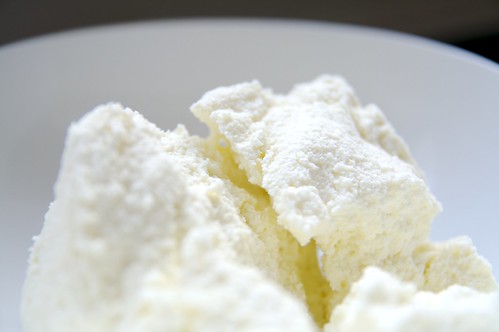 I have been on a pancake kick lately. I like buttermilk pancakes but since I have to work with what I've got, I usually substitute regular milk that has been soured with vinegar for the buttermilk. Last night I heated some milk (as being at room temperature or slightly warm aids the souring process) and added apple cider vinegar to it, expecting it to just mix in. In a few moments, I realized that I had overheated the milk and the vinegar had begun to coagulate it.
I have been on a pancake kick lately. I like buttermilk pancakes but since I have to work with what I've got, I usually substitute regular milk that has been soured with vinegar for the buttermilk. Last night I heated some milk (as being at room temperature or slightly warm aids the souring process) and added apple cider vinegar to it, expecting it to just mix in. In a few moments, I realized that I had overheated the milk and the vinegar had begun to coagulate it.For a moment, I didn't know what to do. Should I toss it out and try to sour another batch? Of course not. I put the lid on the jar that I had heated the milk in and shook it around, watching the small curds that were forming inside. Since the milk wasn't very hot to begin with, not very much cheese actually formed. I stowed the jar in the refrigerator and decided that I would still use it to make pancakes.
This morning I contemplated the jar again. I could see the curdy bits floating around ominously. I knew they'd be fine, but this was my first time experiencing the non way-past-its-expiration-date kind of curdled milk. Hesitantly, I used a fork to fish out a small sample of the curds and tasted it.
The vinegar flavor was strong, probably due to the lack of mixing, but the creamy texture of the cheese made me want to try more. For my next bite, I sprinkled a tiny bit of kosher salt on the curds. It was lovely and clean and the salt helped minimize the vinegar flavor.
I think I'll do it on purpose next time. Also, I had used 2% milk-- I know that this will be even better with whole milk.
I had always wanted to try to make ricotta at home, but it took a souring accident to make me believe I could actually do it. And this, this is why I love cooking: the happy and potentially delicious accidents.
Photo credit: Moritz*